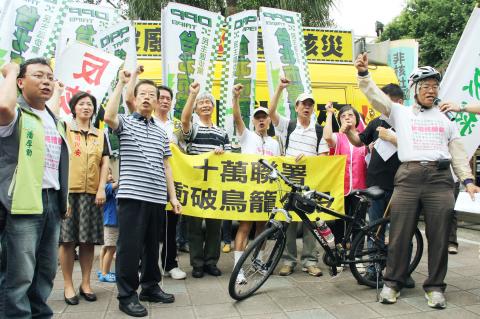After completing a 13-day trip around the nation, a cycling team formed by the Taiwan Environmental Protection Union (TEPU) to collect signatures in support of asking a second question in a referendum to decide the fate of the Fourth Nuclear Power Plant in New Taipei City’s (新北市) Gongliao District (貢寮) returned to Taipei yesterday.
The cyclists were welcomed by more than a dozen representatives from several anti-nuclear civic groups and political parties in front of the Legislative Yuan at noon.
Team leader Kao Cheng-yan (高成炎), a National Taiwan University professor and TEPU member, said they chose to start their journey on June 5 — World Environment Day — to reflect the public’s strong opposition to nuclear power in light of the negative effects it has on the environment and people of Taiwan.

Photo: CNA
“We were taken care of by many enthusiastic and warm people throughout our trip across the nation. Presbyterian churches in Greater Taichung, Yunlin, Chiayi and Keelung even provided us free accommodation,” Kao said, adding that local branches of the Democratic Progressive Party, county commissioners and mayors had also shown support for the petition.
The question the team was trying to gather support for was: “Do you agree that fuel rods should be installed in the Fourth Nuclear Power Plant and that it be allowed to go into test operation?”
Kao said the team collected thousands of signatures, but the national campaign for gathering the 100,000 signatures needed to submit its petition continues.
“Only if the two questions are asked will the referendum be offering the public a real choice,” he said.
TEPU said it is confident it will meet the signature requirement because the “wildfire of anti-nuclear voices has been lit.”

Alain Robert, known as the "French Spider-Man," praised Alex Honnold as exceptionally well-prepared after the US climber completed a free solo ascent of Taipei 101 yesterday. Robert said Honnold's ascent of the 508m-tall skyscraper in just more than one-and-a-half hours without using safety ropes or equipment was a remarkable achievement. "This is my life," he said in an interview conducted in French, adding that he liked the feeling of being "on the edge of danger." The 63-year-old Frenchman climbed Taipei 101 using ropes in December 2004, taking about four hours to reach the top. On a one-to-10 scale of difficulty, Robert said Taipei 101

Nipah virus infection is to be officially listed as a category 5 notifiable infectious disease in Taiwan in March, while clinical treatment guidelines are being formulated, the Centers for Disease Control (CDC) said yesterday. With Nipah infections being reported in other countries and considering its relatively high fatality rate, the centers on Jan. 16 announced that it would be listed as a notifiable infectious disease to bolster the nation’s systematic early warning system and increase public awareness, the CDC said. Bangladesh reported four fatal cases last year in separate districts, with three linked to raw date palm sap consumption, CDC Epidemic Intelligence

US climber Alex Honnold left Taiwan this morning a day after completing a free-solo ascent of Taipei 101, a feat that drew cheers from onlookers and gained widespread international attention. Honnold yesterday scaled the 101-story skyscraper without a rope or safety harness. The climb — the highest urban free-solo ascent ever attempted — took just more than 90 minutes and was streamed live on Netflix. It was covered by major international news outlets including CNN, the New York Times, the Guardian and the Wall Street Journal. As Honnold prepared to leave Taiwan today, he attracted a crowd when he and his wife, Sanni,

Two Taiwanese prosecutors were questioned by Chinese security personnel at their hotel during a trip to China’s Henan Province this month, the Mainland Affairs Council (MAC) said yesterday. The officers had personal information on the prosecutors, including “when they were assigned to their posts, their work locations and job titles,” MAC Deputy Minister and spokesman Liang Wen-chieh (梁文傑) said. On top of asking about their agencies and positions, the officers also questioned the prosecutors about the Cross-Strait Joint Crime-Fighting and Judicial Mutual Assistance Agreement, a pact that serves as the framework for Taiwan-China cooperation on combating crime and providing judicial assistance, Liang